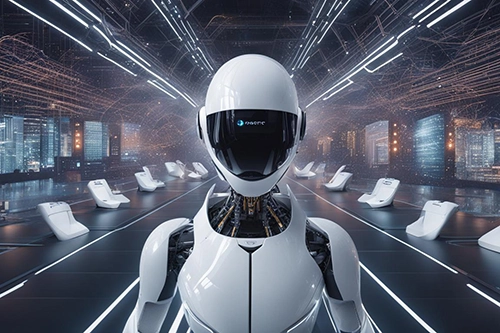The AI revolution is not just about machines and algorithms becoming an integral part of our daily lives; it’s about how these advancements redefine the fabric of society, business, and personal interactions. As we delve into this transformative phase, it’s crucial to understand the multifaceted nature of AI – its boundless opportunities, the challenges that need addressing, and the profound societal impact it promises.
The Transformative Power of AI in Business
The influence of AI in the business world is undeniable. A survey by Deloitte involving 2,620 global leaders revealed that a staggering 94% believe AI is critical to their success. This technology is not just a tool; it’s a game-changer, offering insights, streamlining processes, and enhancing customer experiences. For entrepreneurs, AI is a beacon of hope and a pathway to compete with established players. It aids in market research, data analysis, and understanding customer preferences, thereby enabling informed decision-making and strategy formulation.
AI’s automation capabilities are revolutionizing business processes. The technology is reshaping how businesses operate, from AI text generators that ease the burden of repetitive tasks to AI-powered chatbots that provide 24/7 customer support. Moreover, AI’s role in personalization is significant, with studies showing that 80% of shoppers prefer brands that offer personalized experiences. AI’s ability to analyze customer behavior and preferences is critical to delivering these tailored experiences, enhancing customer engagement, and driving business growth.
Smart Cities: The Urban Future
The concept of smart cities is gaining momentum, with predictions that the global intelligent city industry will reach a valuation of $3,110 billion by 2028. This growth is fueled by integrating technologies like IoT, AI, and big data analytics into urban planning. Smart city solutions lead to advanced urban design, improved energy conservation, and enhanced public services. Cities worldwide are adopting intelligent technologies to upgrade infrastructure and improve the quality of life for their citizens.
AI and Big Data: A Powerful Duo
The synergy between AI and big data shapes future trends across various sectors. AI thrives on big data, enhancing its understanding of consumer behaviors and preferences. This combination streamlines operations and enables businesses to pivot strategies based on real-time insights. However, the effectiveness of AI in this context is closely tied to the quality of the data it processes.
AI in Creative Industries
AI also makes its mark in creative fields like music, video, and design. It enables new avenues for creativity and innovation, from predictive algorithms in fashion to AI-driven design software in architecture. AI is used in music to create new compositions, while in video production, it’s optimizing content for engagement and quality.
Challenges and Impact on Society
While AI offers numerous benefits, it challenges data privacy, cybersecurity, and regulatory landscapes. Ensuring the safety of data used by AI systems is paramount, as is the need for clear guidelines and policies for ethical AI use.
AI also enhances accessibility for disabled individuals, offering tools like text-to-speech software that transform written content into spoken words. AI fosters more inclusive environments in the workplace by aiding accessibility and breaking down language barriers.
Conclusion
The future of AI is bright, with its potential to improve lives, drive innovation, and solve complex problems. As we navigate this AI revolution, finding the right balance between AI capabilities and human intuition is essential. Embracing AI’s speed, efficiency, and depth of human understanding will be vital in shaping a future where technology enhances our inherent human strengths.







